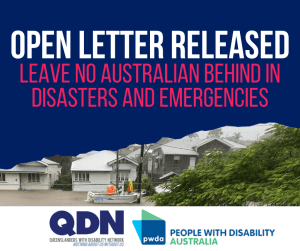QDN e-News Video Update - April 2022 Week 2
Federal Election 2022
QDN's Members Federal Election Briefing was held on the 7 May
The federal election is just around the corner, we have launched our policy platform, ‘My disability vote counts: Act for inclusion’, and we want you to get involved!
Want to make sure that your candidates know what your disability vote will count for. The federal election must be held by 21 May 2022.
Read more about our policy platform here »

Open Letter
Thursday 31 March 2022: A coalition of 40 leading disability rights, advocacy and peak body organisations has endorsed a pre-election open letter to politicians across the country demanding a new approach and more resources for improving disaster and emergency responses for people with disability.
Read more about the open letter here »

Parliament Passes NDIS Amendment (Participant Guarantee & Other Amendment) Bill
On the 31 March the Australian government passed the NDIS Amendment (Participant Guarantee & Other Amendment) Bill. The stated aim of this Bill was to reduce red tape and increase flexibility for participants and build on the recommendations of the Tune Review.
This legislates the Participant Service Guarantee which sets clear timeframes for key NDIS processes. The NDIA must make decisions about access, plan approvals, plan reviews and nominee changes within these timeframes.
The legislation also introduces changes to provide more flexibility to participants and the National Disability Insurance Agency (NDIA), and to make it easier for participants to vary their plans, without the need for a full plan review.
The legislation also aims to make payments easier, so participants don’t need to use their own money for services and claim reimbursement, and enables real-time reporting of participant budget balances.
In summary, the key reforms in the legislation include:
- The Participant Service Guarantee will set timeframes for decision making by the National Disability Insurance Agency (NDIA) and set strict service standards.
- The Commonwealth Ombudsman will report on the NDIA’s performance against the Guarantee.
- Increased flexibility for participants and the NDIA.
- Embedding co-design with people with disability and their representatives.
- Participants will be able to make changes to their plan without the need for a full plan review.
- Flexibility in how payments can be made, allowing the NDIA to pay providers directly on behalf of participants - so participants don’t need to use their own money for services and claim re-imbursement.
- Provisions that originally enabled transition to the NDIS, but which are no longer needed now the scheme is fully operational across the whole country will be removed.
- The requirements to be considered in making appointments to the NDIA Board will be extended to specifically include people with disability or lived experience of disability.
QDN is keen to work with our members to hear their on the ground experiences of this new legislation. In the coming months we want to hear from you about your expeiences of the following:
- Is it easier for you to make changes to your plan?
- Do you feel the NDIA has involved you in the process of co-design of your plan?
- Is the NDIS responding to you in a timely manner?
Get in touch with us via 1300 363 783 or qdn@qdn.org.au.
Queenslands Women Strategy
Disability Royal Commission
Public Hearing #13 Report – Preventing and responding to violence, abuse, neglect and exploitation in disability services
New Issues paper on the impact of and responses to the Omicron wave of the COVID-19 pandemic for people with disability
Emerging Leaders
COVID-19 Update
COVID-19 winter doses for people with disability living in shared residential accommodation
The Australian Technical Advisory Group on Immunisation (ATAGI) have recommended a COVID-19 winter dose for people who are most at risk of severe illness. This includes:
- adults aged 65 years and older
- Aboriginal and Torres Strait Islander people over the age of 50
- people in disability and aged care accommodation settings
- people aged 16 years and older who are severely immunocompromised.
ATAGI recommends these groups receive their COVID-19 winter dose from 4 months after their initial booster dose. In some circumstances this timeframe can be shortened but cannot be less than 3 months from the previous booster dose.
ATAGI advises that COVID-19 winter doses can be administered at the same time as the annual flu vaccination. Co-administration of COVID-19 winter doses and influenza vaccines for residents is both clinically safe and administratively efficient.
For more information, please see ATAGI’s full statement.
COVID-19 Restrictions Update
Queensland COVID-19 restrictions are easing further from 1am Thursday 14 April.
From then, most venues that have been open only to vaccinated staff and patrons will be open to everyone, regardless of vaccination status.
The venues include:
- Pubs, clubs, cafés and restaurants
- Theme parks, casinos and cinemas
- Weddings
- Showgrounds
- Galleries, libraries, museums and stadiums
Vaccine requirements will still apply to visitors and workers in vulnerable settings including:
- Hospitals
- Aged and disability care
- Prisons
- Schools and early childhood centres
More than 90% of Queenslanders aged 12 and over have been fully vaccinated.
The Chief Health Officer advises we can now safely ease these settings and still maintain a high level of protection.
For information on restrictions click here »
New COVID-19 video resources and factsheets
New video resources and factsheets have been published on the Queensland Health website here.
How to do a saliva rapid antigen test
How to do a nasal rapid antigen test
What to do if I have COVID-19?
The model of care for COVID-19
Information about rapid antigen tests
Q&A with Dr Dinesh Palipana OAM
